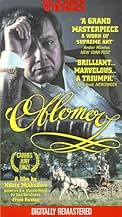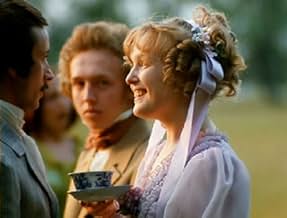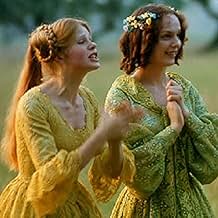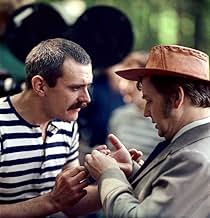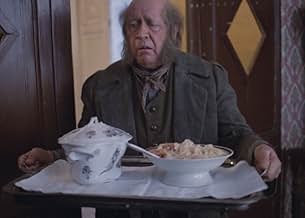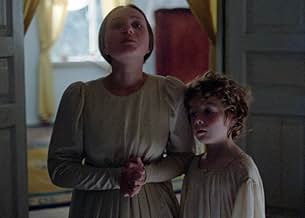IMDb रेटिंग
7.6/10
2.7 हज़ार
आपकी रेटिंग
अपनी भाषा में प्लॉट जोड़ेंSt. Petersburg, mid 19th century: the indolent, middle-aged Oblomov. He sleeps much of the day. His boyhood companion, Stoltz, now an energetic and successful businessman, adds Oblomov to hi... सभी पढ़ेंSt. Petersburg, mid 19th century: the indolent, middle-aged Oblomov. He sleeps much of the day. His boyhood companion, Stoltz, now an energetic and successful businessman, adds Oblomov to his circle and introduces him to Olga.St. Petersburg, mid 19th century: the indolent, middle-aged Oblomov. He sleeps much of the day. His boyhood companion, Stoltz, now an energetic and successful businessman, adds Oblomov to his circle and introduces him to Olga.
- निर्देशक
- लेखक
- स्टार
- पुरस्कार
- 2 जीत और कुल 2 नामांकन
Yelena Kleshchevskaya
- Katya
- (as Ye. Kleshchevskaya)
Galina Shostko
- Olga's aunt
- (as G. Shostko)
Gleb Strizhenov
- The Baron
- (as G. Strizhenov)
Evgeniy Steblov
- Oblomov's father
- (as Ye. Steblov)
Evgeniya Glushenko
- Oblomov's mother
- (as Ye. Glushenko)
Nikolai Pastukhov
- Stoltz's father
- (as N. Pastukhov)
फ़ीचर्ड समीक्षाएं
According to the Kino DVD, this film won the Cannes Jury Prize upon its release in 1979. Oleg Tabakov brings sensitivity to the title role- we actually feel sympathy for this lovable loser who has lead a rather unproductive life. He has worked in the past, but none of his dreams or goals (if he ever had any) have come to fruition. As the character develops, we discover that this isn't from laziness, but more that he's afraid to take any risks in life. The director, Nikita Mikhalkov, won the Oscar for Best Foreign film in '94 for Burnt By The Sun, but I think Oblomov is actually the better film, with the caveat that it is a little long. The films share a common theme of two men in love with the same woman. And he also returns to E.Artemyev for the musical score of the film (also includes Bellini's "Casta Diva" and music by Rachmaninov).
Oblomov and his best friend Stolz are so different in character that the film uses flashbacks to their upbringings to discover why. Stolz's relationship with his father is much more interesting than Oblomov's with his mother, and perhaps some editing here would help. The acting is great throughout, especially Oblomov's relationship with his servant Zakhar. The film has a couple of emotional climaxes, when Oblomov confesses his shame to Stolz in the sauna, and when he confesses his love for Olga on the gazebo. Olga's weeping at the end of the film suggests she has some regrets for past decisions. Oblomov's son running across the fields to visit his mother, well, someone else will have to elucidate that for me.
Oblomov and his best friend Stolz are so different in character that the film uses flashbacks to their upbringings to discover why. Stolz's relationship with his father is much more interesting than Oblomov's with his mother, and perhaps some editing here would help. The acting is great throughout, especially Oblomov's relationship with his servant Zakhar. The film has a couple of emotional climaxes, when Oblomov confesses his shame to Stolz in the sauna, and when he confesses his love for Olga on the gazebo. Olga's weeping at the end of the film suggests she has some regrets for past decisions. Oblomov's son running across the fields to visit his mother, well, someone else will have to elucidate that for me.
One of the best films directed by Nikita Mikhalkov and one of the best adaptations of the works of the writer Ivan Goncharov. The magnificent trio of actors Oleg Tabakov, Yuri Bogatyrev and Elena Solovey as if immerses the viewer in the romantic atmosphere of a love triangle in Russia of the 19th century.
not a surprise. the novel by Goncharov is perfect choice for Mikhalkov style. Oleg Tabakov translate on screen the entire soft and fragile universe of his character. the atmosphere, the dialogs, the profound drama - pieces of a seductive film. and little more because, like in many same adaptations, the movie is a trip in the space between lines. Oblomov has new nuances. his struggle for happiness has new points who gives to the portrait from novel special significance. not a victim, not a symbol. but the good man who has a single challenge - himself. the portrait becomes seductive. and clear in new light. Tabakov explores the limits and the isles of illusion. and Mikhalkov has the courage and art and subtle science to transform the world of XIX century in shadow of a new Idiot. Oblomov becomes more realistic. and more easy to define it in a large measure. a film from a special art of seduction.
This story of a 19th-century Russian land owner (Oblomov) begins slowly, with scenes that puzzle and seem almost contradictory. The beginning denies you any emotional involvement, but as the film progresses you're dragged into Oblomov's psyche.
Early on there's a scene where two young boys are spinning themselves around in the seat of a swing to get dizzy. That's almost the sensation you get as you find yourself completely immersed in Oblomov's world. Not that you're reeling or disoriented, but that everything else becomes shut out.
The film moves along at a genteel pace, and, in that unique Russian way, when emotions burst through the societal veneer, you're completely clobbered. It's like someone sneaking up from behind and conking you on the head. The human condition being what it is, it's impossible not to identify with Oblomov. For anyone who has ever deliberated, doubted, or procrastinated--in other words, everyone--this film provides layers and layers of meaning, gently filtered through a portrait of Russian gentry.
To my surprise, I find myself wanting to call this a great film. It seems an improbable tag for such a slender story. But the crafting of the film is absolutely top tier: acting, cinematography, pacing--everything, really. Put that together with the haunting subtext, and you get a film well worth seeing.
Early on there's a scene where two young boys are spinning themselves around in the seat of a swing to get dizzy. That's almost the sensation you get as you find yourself completely immersed in Oblomov's world. Not that you're reeling or disoriented, but that everything else becomes shut out.
The film moves along at a genteel pace, and, in that unique Russian way, when emotions burst through the societal veneer, you're completely clobbered. It's like someone sneaking up from behind and conking you on the head. The human condition being what it is, it's impossible not to identify with Oblomov. For anyone who has ever deliberated, doubted, or procrastinated--in other words, everyone--this film provides layers and layers of meaning, gently filtered through a portrait of Russian gentry.
To my surprise, I find myself wanting to call this a great film. It seems an improbable tag for such a slender story. But the crafting of the film is absolutely top tier: acting, cinematography, pacing--everything, really. Put that together with the haunting subtext, and you get a film well worth seeing.
Now, this is not a story about Russian apathy, or the rot of aristocracy that, as some "historians" claim, led to the October Revolution.
This is a story about the immortality, and fragility of love. Love dies only to be reborn anew, it will not perish until the end of humankind. "Some days from the life of Oblovomov" is a deeply touching movie, with kind humor and some really sad scenes.
The actors are exceptionally talented and fit their roles perfectly - Oleg Tabakov, as a through-and-through melancholic and Yuri Bogatiryov deliver a really memorable performance. Even though it takes quite a while to get used to the movie's pace (it was filmed in USSR 30 years ago!), it's worth as it you see the story unfold.
Highly recommended for everyone with a taste for thoughtful movies.
This is a story about the immortality, and fragility of love. Love dies only to be reborn anew, it will not perish until the end of humankind. "Some days from the life of Oblovomov" is a deeply touching movie, with kind humor and some really sad scenes.
The actors are exceptionally talented and fit their roles perfectly - Oleg Tabakov, as a through-and-through melancholic and Yuri Bogatiryov deliver a really memorable performance. Even though it takes quite a while to get used to the movie's pace (it was filmed in USSR 30 years ago!), it's worth as it you see the story unfold.
Highly recommended for everyone with a taste for thoughtful movies.
क्या आपको पता है
- गूफ़When Oblomov is writing his farewell letter to Olga, the candles are nearly blown out by the wind, but the light shed remains the same.
- कनेक्शनFeatured in Oleg Tabakov. Smotryu na mir vlyublyonnymi glazami (2015)
टॉप पसंद
रेटिंग देने के लिए साइन-इन करें और वैयक्तिकृत सुझावों के लिए वॉचलिस्ट करें
- How long is A Few Days from the Life of I.I. Oblomov?Alexa द्वारा संचालित
विवरण
इस पेज में योगदान दें
किसी बदलाव का सुझाव दें या अनुपलब्ध कॉन्टेंट जोड़ें

टॉप गैप
By what name was Neskolko dney iz zhizni I.I. Oblomova (1980) officially released in India in English?
जवाब
